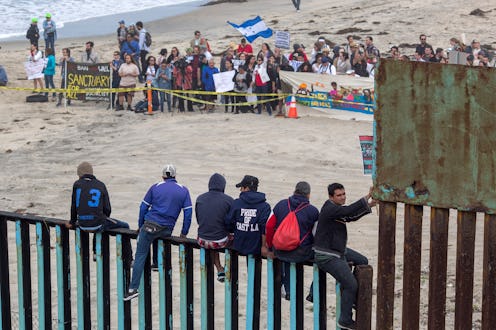News
Here's What Could Lie Ahead For The Migrant Caravan That Just Arrived At The Border

Hundreds of Central Americans arrived at the U.S.-Mexico border on Sunday, intending to seek asylum in the United States. Many are reportedly fleeing violence and political instability, and they hope to find safety in America. If you've been reading the president's tweets over the last month, you might find yourself wondering what the migrant caravan Trump keeps talking about is. The answer is complicated, and those traveling with it face uncertain futures.
According to The Washington Post, most of the migrants in this particular caravan are fleeing Honduras or El Salvador, both of which have extraordinarily high murder rates. The caravan was organized by migrant outreach collective Pueblo Sin Fronteras, and they have reportedly been coordinating similar caravans since 2008. However, now Trump is president, and if his tweets are any indication, he has been watching this group of migrants closely. The group has been traveling north for more than a month, according to the Post.
"Despite the Democrat inspired laws on Sanctuary Cities and the Border being so bad and one sided, I have instructed the Secretary of Homeland Security not to let these large Caravans of people into our Country," Trump tweeted on April 23. "It is a disgrace. We are the only Country in the World so naive! WALL."
While asylum seeking is an entirely legal process, so long as it is pursued properly, Trump and many other Republicans have characterized the caravan as a way to thwart U.S. immigration policies. CBS reports that Attorney General Jeff Sessions described the caravan as "a deliberate attempt to undermine our laws and overwhelm our system."
In a statement about the caravan, Secretary of Homeland Security Kirstjen Nielsen said that she would "enforce the immigration laws as set forth by Congress," and emphasized the need to close legal "loopholes" which she says let criminals get into the country:
Let me be clear: we will enforce the immigration laws as set forth by Congress. If you enter our country illegally, you have broken the law and will be referred for prosecution. If you make a false immigration claim, you have broken the law and will be referred for prosecution. If you assist or coach an individual in making a false immigration claim, you have broken the law and will be referred for prosecution.
She also urged caravan members to seek asylum in Mexico. Hundreds of asylum seekers reportedly did decide to stay in Mexico, however, with many stopping their journey in Mexico City. Up to that point, this caravan was reportedly carrying up to approximately 1,000 people — the largest that the organizing group had ever seen.
"When we saw the numbers, we were shocked,” Irineo Mujica, an activist who helped organize the trip told the Post early in April. "It’s impossible to travel with this many people."
As for those who continued on to the U.S.-Mexico border, what will happen to them in the coming days is unclear. On Sunday, groups planned to walk to the official point of entry on the border, and present themselves to authorities as asylum-seekers. But by Sunday evening, U.S. Customs and Border Patrol said that the entryway that the migrants had intended to cross over had already reached its daily maximum.
That being said, hope is not yet lost. NBC reports that lawyers have reviewed many of the cases in advance. Nearly 200 caravan members have already secured lawyers who've planned strong arguments.
"The reason why the legal review is important is [so that] people who do not have a well articulated asylum claim and no chance of winning do not needlessly subject themselves to a system that is designed to deport them — not protect them, deport them," human rights attorney Nicole Ramos, told NBC.
While Sec. Nielsen said that the migrants should have sought asylum in Mexico, she also said in a statement that the DHS and DOJ have taken "steps to ensure the necessary resources are in place to promptly adjudicate all cases and claims, through either our civil immigration system or through criminal prosecution, consistent with our laws."
Asylum can be sought through the Department of Homeland Security upon entry, and also through the Department of Justice, often in response deportation cases, the Post reports. As for what actually happens when the migrants present themselves, that much is a wait-and-see. Whether they would try again Monday morning is not yet known.